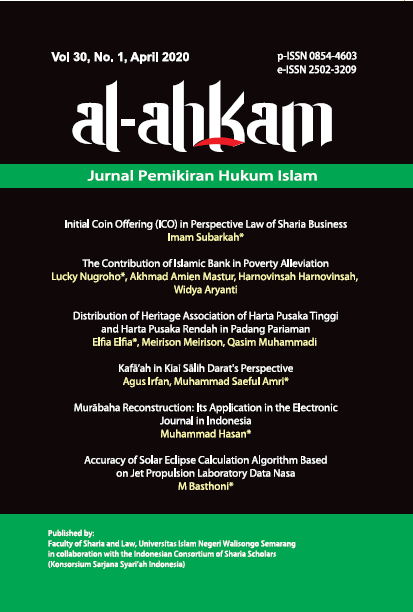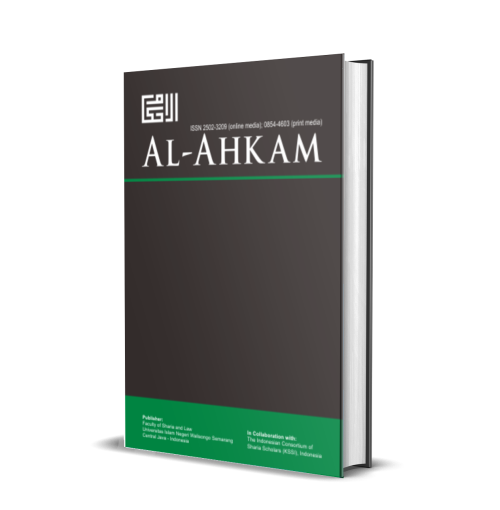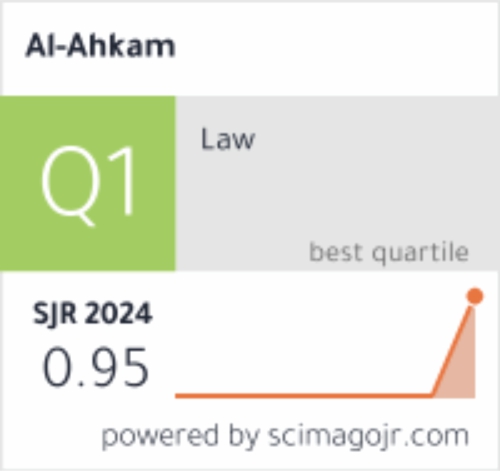The Contribution of Islamic Bank in Poverty Alleviation
DOI:
https://doi.org/10.21580/ahkam.2020.30.1.5387Keywords:
Islamic bank financing, Islamic bank asset, Islamic bank branch office, poverty alleviationAbstract
The existence of Islamic banks as one part of Islamic financial institutions should contribute to improving the economy, one of which is to reduce poverty. Therefore, the purpose of this study is to investigate the effect of financing variables, asset variables, and Islamic bank office variables on poverty levels. The sample used to be Islamic Commercial Banks (BUS) in the 2013-2017 period, with a total of 110 samples. The methodology used is quantitative with multiple regression statistical analysis and statistical data processing using SPSS software version 20. The results of the study note that financing has a negative and significant effect, namely, the higher the financing of Islamic banks, it will reduce poverty. However, the total assets and the number of networks that have a positive and significant effect, namely the increase in total assets and branch networks, it will affect the increasing amount of poverty. That is because the assets of Islamic banks are supported by the majority savings and the not optimal yet of distribution of financing from Islamic banks to the community. Also, the existence of the Islamic branch office tends to be found in provincial capitals and big cities, so that the communities in rural and remote areas are still not reached by Islamic banks.
Downloads
References
Aliyu, Sirajo, M. Kabir Hassan, Rosylin Mohd Yusof, and Nasri Naiimi. ‘Islamic Banking Sustainability: A Review of Literature and Directions for Future Research’. Emerging Markets Finance and Trade 53, no. 2 (February 2017): 440–70. https://doi.org/10.1080/1540496X.2016.1262761.
Allen, Franklin, Ana Babus, and Elena Carletti. ‘Asset Commonality, Debt Maturity and Systemic Risk’. Journal of Financial Economics 104, no. 3 (June 2012): 519–34. https://doi.org/10.1016/j.jfineco.2011.07.003.
Andriyanto, Irsyad. ‘Strategi Pengelolaan Zakat dalam Pengentasan Kemiskinan’. Jurnal Walisongo 19, no. 1 (2011): 25–46.
Arafah, Willy, and Lucky Nugroho. ‘Maqhashid Sharia in Clean Water Financing Business Model at Islamic Bank’. International Journal of Business and Management Invention (IJBMI) 5, no. 2 (May 2016): 22–32.
Arianto, Dwi Agung Nugroho. ‘Peranan Al-Mudharabah sebagai Salah Satu Produk Perbankan Syariah dalam Upaya Mengentaskan Kemiskinan di Indonesia’. Jurnal Ekonomi & Pendidikan 8, no. 2 (2011): 124–41. https://doi.org/10.1007/978-90-481-2532-6_2.
Asutay, Mehmet. ‘Conceptualisation of the Second Best Solution in Overcoming the Social Failure of Islamic Banking and Finance : Examining the Overpowering of Homoislamicus by Homoeconomicus.’ Journal of Economic and Management 15, no. 2 (2007): 167–95.
Barrientos, Armando, Mark Gorman, and Amanda Heslop. ‘Old Age Poverty in Developing Countries: Contributions and Dependence in Later Life’. World Development 31, no. 3 (March 2003): 555–70. https://doi.org/10.1016/S0305-750X(02)00211-5.
Bennett, Michael S., and Zamir Iqbal. ‘How Socially Responsible Investing Can Help Bridge the Gap Between Islamic and Conventional Financial Markets’. International Journal of Islamic and Middle Eastern Finance and Management 6, no. 3 (August 2013): 211–25. https://doi.org/10.1108/IMEFM-Aug-2012-0078.
Berger, Allen N., Gerald A. Hanweck, and David B. Humphrey. ‘Competitive Viability in Banking. Scale, Scope, and Product Mix Economies’. Journal of Monetary Economics 20, no. 3 (December 1987): 501–20. https://doi.org/10.1016/0304-3932(87)90039-0.
Bloom, Nicholas; Aprajit Mahajan; David McKenzi; John Roberts. ‘Why Do Firms in Developing Countries Have Low Productivity?’ American Economic Review 100, no. 2 (2010): 619–23. https://doi.org/10.1257/aer.100.2.619.
BPS. ‘Angka Kemiskinan Indonesia Sentuh 9,66%, Terendah Sepanjang Sejarah | Databoks’. Katadata.co.id, 2019.
Choudhury, Masudul Alam, and Md Mostaque Hussain. ‘A Paradigm of Islamic Money and Banking’. International Journal of Social Economics 32, no. 3 (2005): 203–17. https://doi.org/10.1108/03068290510580760.
Dusuki, Asyraf Wajdi. ‘Understanding the Objectives of Islamic Banking: A Survey of Stakeholders’ Perspectives’. International Journal of Islamic and Middle Eastern Finance and Management 1, no. 2 (2008): 132–48. https://doi.org/10.1108/17538390810880982.
Fahmy Zarkasyi, Hamid. ‘Tamaddun sebagai Konsep Peradaban Islam’. Tsaqafah 11, no. 1 (2015): 1–28.
Fajriah, Lily Rusna. ‘Angka Kemiskinan Meningkat Tembus 28,51 Juta Orang’. sindonews.com, 2016.
Feldman, Maryann P. ‘The Character of Innovative Places: Entrepreneurial Strategy, Economic Development, and Prosperity’. Small Business Economics 43, no. 1 (March 2014): 9–20. https://doi.org/10.1007/s11187-014-9574-4.
Haniffa, Roszaini, and Mohammad Hudaib. ‘Exploring the Ethical Identity of Islamic Banks via Communication in Annual Reports’. Journal of Business Ethics 76, no. 1 (November 2007): 97–116. https://doi.org/10.1007/s10551-006-9272-5.
Lubis, Delima Sari. ‘Pemberdayaan UMKM Melalui Lembaga Keuangan Syariah sebagai Upaya Pengentasan Kemiskinan Kota Padangsidimpuan’. At-Tijaroh: Jurnal Ilmu Manajemen Dan Bisnis Islam 2, no. 2 (2016): 270–85.
Masyita, Dian. ‘Why Do People See a Financial System as a Whole Very Important?’ Journal of Islamic Monetary Economics and Finance 1, no. 1 (2015): 79–106.
Medias, Fahmi. ‘Wakaf Produktif dalam Perspektif Ekonomi Islam’. La_Riba 4, no. 1 (2016): 71–86. https://doi.org/10.20885/lariba.vol4.iss1.art5.
Meiwanto Doktoralina, Caturida, and Fikki Mutarotun Nisha. ‘Mudharabah Deposits Among Conventional Bank Interest Rates, Profit-Sharing Rates, Liquidity and Inflation Rates’. International Journal of Financial Research 11, no. 1 (2020): 25–33. https://doi.org/10.5430/ijfr.v11n1p25.
Mersland, Roy, Trond Randøy, and Reidar Øystein Strøm. ‘The Impact of International Influence on Microbanks’ Performance: A Global Survey’. International Business Review 20, no. 2 (April 2011): 163–76. https://doi.org/10.1016/j.ibusrev.2010.07.006.
Mukminin, Khairul. ‘Profit Maximization in Islamic Banking: An Assemblage of Maqasid Shariah Conception’. Profit Maximization in Islamic Banking: An Assemblage of Maqasid Shariah Conception, no. 12 (2019): 1–11. https://doi.org/10.13135/2421-2172/2856.
Mulyadi, Mohammad. ‘Peran Pemerintah dalam Mengatasi Pengangguran dan Kemiskinan dalam Masyarakat’. Kajian 21, no. 3 (2016): 221–36.
Nugroho, Lucky, and Ahmad Badawi. ‘The Islamic Banking, Asset Quality: “Does Financing Segmentation Matters” (Indonesia Evidence)’. Mediterranean Journal of Social Sciences 9, no. 5 (2018): 221–35. https://doi.org/10.2478/mjss-2018-0154.
Nugroho, Lucky, Ahmad Badawi, and Nurul Hidayah. ‘Indonesia Islamic Bank Profitability 2010-2017’. Shirkah Journal of Economics and Business 4, no. 1 (2019): 75–99.
Nugroho, Lucky, Tengku Chandra Husnadi, Wiwik Utami, and Nurul Hidayah. ‘Maslahah and Strategy to Establish a Single State-Owned Islamic Bank in Indonesia’. Tazkia Islamic Finance and Business Review 10, no. 1 (2017): 17–33.
Nugroho, Lucky, Nurul Hidayah, and Ahmad Badawi. ‘Discourses of Sustainable Finance Implementation in Islamic Bank (Cases Studies in Bank Mandiri Syariah 2018)’. International Journal of Financial Research 10, no. 6 (2019): 108–17. https://doi.org/10.5430/ijfr.v10n6p108.
Nugroho, Lucky, and Dewi. Tamala. ‘Persepsi Pengusaha UMKM terhadap Peran Bank Syariah’. Jurnal SIKAP (Sistem Informasi, Keuangan, Auditing Dan Perpajakan) 3, no. 1 (2018): 49–62.
Nugroho, Lucky, Wiwik Utami, and Caturida Meiwanto Doktoralina. ‘Ekosistem Bisnis Wisata Halal dalam Perspektif Maqasid Syariah (Halal Tourism Business Ecosystem in the Maqasid Syariah Perspective)’. Perisai : Islamic Banking and Finance Journal 3, no. 2 (2019): 84–92. https://doi.org/10.21070/perisai.v3i2.1964.
Ozturk, Ilhan, Alper Aslan, and Huseyin Kalyoncu. ‘Energy Consumption and Economic Growth Relationship: Evidence from Panel Data for Low and Middle Income Countries’. Energy Policy 38, no. 8 (August 2010): 4422–28. https://doi.org/10.1016/j.enpol.2010.03.071.
Pratama, Yoghi Citra. ‘Analisis Faktor-Faktor yang Mempengaruhi Kemiskinan di Indonesia’. Esensi: Jurnal Bisnis Dan Manajemen 4, no. 2 (2014): 210–23.
Rimadhani, Mustika, and Osni Erza. ‘Analisis Variabel-Variabel Yang Mempengaruhi Pembiayaan Murabahah Pada Bank Syariah Mandiri Periode 2008.01-2011.12’. Media Ekonomi 19, no. 1 (2011): 27–52.
Rosyid, Maskur, and M. Nurul Irfan. ‘Reading Fatwas of MUI a Perspective of Maslahah Concept’. Syariah: Jurnal Hukum Dan Pemikiran 19, no. 1 (2 June 2019): 91–117.
Santana, Paula. ‘Poverty, Social Exclusion and Health in Portugal’. In Social Science and Medicine, 55:33–45. Pergamon, 2002. https://doi.org/10.1016/S0277-9536(01)00218-0.
Satibi, Elsa, Wiwik Utami, and Lucky Nugroho. ‘A Comparison of Sharia Banks and Conventional Banks in Terms of Efficiency, Asset Quality and Stability in Indonesia for the Period 2008-2016’. International Journal of Commerce and Finance 4, no. 1 (2018): 134–49.
TribunJogja. ‘Penelitian : Islam Agama dengan Pertumbuhan Paling Cepat di Dunia - Tribun Jogja’. jogja.tribunnews.com, 2017.
Wajdi Dusuki, Asyraf. ‘Banking for the Poor: The Role of Islamic Banking in Microfinance Initiatives’. Edited by Masudul Alam Choudhury. Humanomics 24, no. 1 (February 2008): 49–66. https://doi.org/10.1108/08288660810851469.
Downloads
Additional Files
Published
How to Cite
Issue
Section
License
By submitting an article to the journal, the author(s) agree to transfer the published article's copyright to the journal, which will act as the publisher. This means the journal will have the right to publish the article in various forms, including reprints. The journal will maintain the publishing rights to the published articles.
In line with the license, authors and third parties (readers, researchers, and others) are allowed to share and adapt the material. In addition, the material must be given appropriate credit, provided with a link to the license, and indicated if changes were made. If authors remix, transform or build upon the material, authors must distribute their contributions under the same license as the original.




